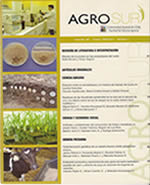Spatial variation of physical properties of a soil derived from volcanic ash subjected to different strategies of improvement of a degraded pasture
Main Article Content
Abstract
Southern Chile presents adequate conditions to develop sheepherding ecosystems. However, from the total of pastures surface in both regions (Los Ríos and Los Lagos) approximately there is a 44% of degraded pastures. Thus, this work is aimed to assess the effects of pastures improvement strategies on spatial variability of soil physical quality. The experiment was realized in the Estación Experimental Agropecuaria Austral, with five pastures on an Andisol: NsF) Naturalized pasture without fertilization; NcF) Improved naturalized pasture with fertilization; Lp+Tr ST) sown Lolium perenne L., Trifolium repens L. pasture with traditional tillage; Lp+Tr CL) sown L.perenne, T.repens pasture with cero tillage; CL) sown pasture with several species L. perenne, T. repens, Bromus valdivianus Phil, Dactylis glomerata L. and Holcus lanatus L. under cero tillage. Following a grid the following parameters were determined: volumetric water content (θc), air conductivity (Kl) and penetration resistance (PR). The data collection was on November 2, 2015, where moderate spatial dependence was determined for all parameters, such that sectors with higher θc (20 Vol.%) in the soil were those that presented lower RP (2,122 kPa) and Kl (0.83 cm s-1). The 30 months since the establishment of pasture improvement strategies have allowed a stabilization of the soil structure that is reflected in the low impact of sheep grazing on the physical parameters evaluated.

